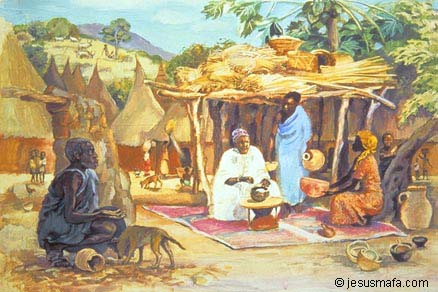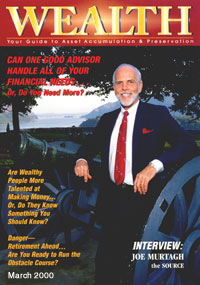 |
The rich man and Lazarus |
He’s One of You
Week of Monday August 2, 2004
Lectionary Readings
Colossians 3:1–11
When my family moved to Moscow on September 7, 1991, that great city of 10 million people boasted just two English-speaking churches. The Catholic church had ministered there since 1934, but since we were Presbyterian, we made the simple choice to attend the Moscow Protestant Chaplaincy (founded in 1962). My wife Patty taught Sunday school, and for two years I was chairperson of the church council. In response to the economic wreckage that devastated so many people in those tumultuous days, we started a soup kitchen program that fed 1,000 Russian pensioners a day, six days a week.
The most fascinating and energizing dimension of the MPC was its social, cultural, ethnic and economic diversity. People from about 30 countries worshipped there, with more than half the congregation coming from fifteen or so African countries. Ambassadors, students, business executives, missionaries, NGO staffers, and even a few local Russians eager to practice their English all worshipped together.
A few years later, across town the Episcopal church began its own services. When our pastor Wayne joined them for a Christmas service, he brought back this report: “Well, the good news is that everyone there was white like me; the bad news is that everyone there was white like me.”
The reading from Colossians 3:11 for this week contains some of the most radical and socially revolutionary words imaginable. In the Christian scheme of things, writes Paul, “there is no Greek or Jew, circumcised or uncircumcised, barbarian, Scythian [1] , slave or free, but Christ is all, and is in all” (NIV). The nearly identical verse in Galatians 3:28 ads “neither male nor female.” According to Paul, the normal canons of exclusion, discrimination, separation and division that characterize so much of our world have no sanction or significance for the believer. The Gospel that he espouses demolishes every barrier we might imagine---religion, race, gender, socio-economics, culture, education, and language.
 For the most part, our exclusionary categories remain deeply entrenched and unusually powerful in our every day social relations. Commenting upon Galatians 3:28, St. Augustine (354—430) observed that they are “embedded in our mortal interactions.” They characterize much if not most of the world today. They also characterize much of Christianity. Bob Abernethy, bureau chief for NBC News in Moscow and fellow parishioner at the MPC, once remarked to me about our Moscow church, “yes, the diversity at MPC is amazing, but it is really limited to the one hour a week here at church.” [2] Sad to say, we believers not only acquiesce to these exclusionary tendencies; we often perpetuate them.
For the most part, our exclusionary categories remain deeply entrenched and unusually powerful in our every day social relations. Commenting upon Galatians 3:28, St. Augustine (354—430) observed that they are “embedded in our mortal interactions.” They characterize much if not most of the world today. They also characterize much of Christianity. Bob Abernethy, bureau chief for NBC News in Moscow and fellow parishioner at the MPC, once remarked to me about our Moscow church, “yes, the diversity at MPC is amazing, but it is really limited to the one hour a week here at church.” [2] Sad to say, we believers not only acquiesce to these exclusionary tendencies; we often perpetuate them.
Take economic distinctions, for example. The Gospel reading for this week is the parable of the Rich Fool (Luke 12:13—21) who built bigger and bigger portfolios for himself, only to die suddenly; it is typical of the disparaging manner in which Jesus often spoke about money. But most of the Christians I know characterize money as a blessing to be sought, much as the rest of the world. When I read the desert fathers who shed their possessions, the depth of their psychological insights about greed, not to mention their sharp wit, amaze me. I see myself all too clearly in the words of St. Neilos the Ascetic (d. 430?): “When we lack something, instead of struggling courageously against our difficulties, we come fawning to the rich, like puppies wagging their tails in the hope of being tossed a bare bone or some crumbs. To get what we want, we call them benefactors and protectors of Christians, attributing every virtue to them, even though they may be utterly wicked.” [3] And this to his own monastic community!
Paul also says that in Christ “there is neither male nor female,” but the church has often followed the world and endorsed blatant misogyny. Plato wrote that the fate of a man who lived an unrighteous or cowardly life was to be reincarnated as a woman. [4] Aristotle believed that nature prefers to generate a male and that females are “deformed males.” [5] We could reproduce far too many examples of similar expressions by Christians. Tertullian (160—220) perpetuated the myth that women were responsible for the Fall when he referred to them as “the devil’s gateway.” [6] Leaping forward to today, the Southern Baptist’s Biblical Recorder of 1868 disavowed the “erroneous opinion that the mental powers of the sexes are equal.” Or consider the Catholic Encyclopedia of 1913 that declared that “the female sex is in some respects inferior to the male sex, both as regards body and soul.” The Unitarian-Universalists were the first denomination to ordain women to ministry, but even that progressive group didn’t make the leap until 1863.
Paul envisioned a dramatically different set of social relations for Christians. Toward the end of his short letter to the Colossians, we find a fascinating biographical tidbit that casts an interesting light on how their Christian community grappled with these matters. Paul had written to them from prison (4:18), and in fact he had never visited their church (2:1). While in prison, he had befriended and converted a runaway slave named Onesimus, who, as it turns out, was from Colossae. When Paul sent his letter to Colossae with the courier Tychicus (4:7) he shocked the Colossian believers by writing that he was also sending Onesimus back with Tychicus. He describes Onesimus as “our faithful and dear brother, who is one of you” (4:9). As one commentator puts it, “it is a striking comment on how the apostle’s thought has leapt across the barriers of social distinction, that he can describe the runaway slave as one of you.” [7]
But there is more. The shortest book in the Bible is addressed to Philemon, the slave owner of Onesimus who worshipped at the same Colossian church. Paul makes a pun on Onesimus’s name. True, he was a runaway slave who ended up in prison. But now in Christ he was Paul’s son, his “very heart.” True, he used to be “useless” to Philemon, but now in Christ he is “useful” to both Paul and Philemon (in Greek Onesimus means “”useful”). Philemon has Onesimus back, “no longer as a slave, but better than a slave, as a dear brother” (Philemon 16). We can only imagine the social dynamics in the Colossian church as Paul urged Philemon to embrace his fugitive slave as more than an equal.
How can we experience Paul’s radical social vision? How do we move from exclusion to embrace? Humanly, I think it is impossible, until we somehow plumb the depths of his insistence that in some mysterious way, “Christ is all, and is in all” (Colossians 3:11).
[1]
The Scythians were the allies of Israel’s great enemy Assyria.
[6]
Tertullian, On the Apparel of Women, I.1.





